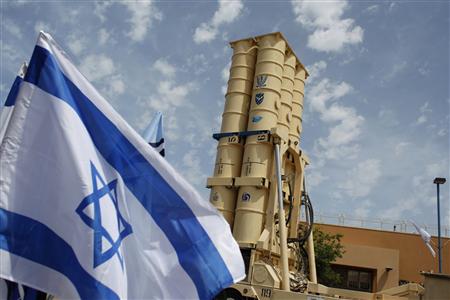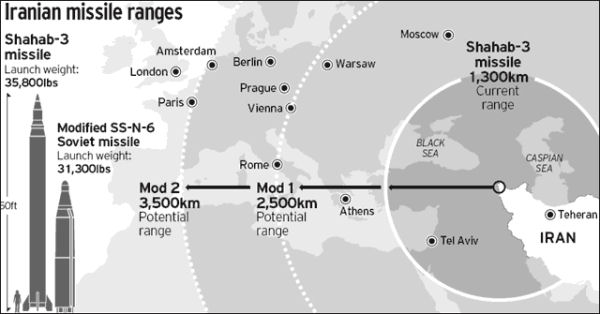![]()
Wed, Aug 03, 2011 | By Alon Sheinberg

An Arrow II missile interceptor is displayed in front of journalists at an Israeli air defence command in the Palmahim military base south of Tel Aviv May 12, 2011. (REUTERS/Nir Elias)
Israel’s Grand Strategy: Deterring Iran’s Ballistic Missile Threat
Israel’s concept of national security has always been based on two interrelated factors: Israel has no choice but to treat the Arab-Israeli conflict as a given and, Israel is bound to take into consideration its narrow margin of security deriving from lack of geographic depth and demographic quantitative inferiority.[1] In view of this and the combined wealth of the Arab states arrayed against it, Israel’s strategy has always recognized the impossibility of a final victory. In 1955, Ben Gurion wrote:
“From our point of view there can never be a final battle. We can never assume we can deliver one final blow to the enemy that will be the last battle, after which there will never be the need for another clash or that the danger of war will be eliminated. The situation for our neighbors is the opposite. They can assume that a final battle will be the last one that may be able to deliver such a blow to Israel that the Arab Israeli problem will be liquidated.”[2]
As a result, Israel’s strategic doctrine has always been centered on deterrence set out to establish a perception in the minds of its enemies that it cannot be defeated by force. This deterrence theory has two pillars: the qualitative and technological edge found in Israel’s conventional forces and Israel’s ambiguous nuclear capabilities which provide the ultimate guard against catastrophe in conventional war and annihilation.
Today Israel’s central threat is perceived to be from Iran, a country led by a radical regime with pan Islamic and regional ambitions that calls for the annihilation of Israel and is on the verge of attaining nuclear weapons. If Iran does achieve nuclear capabilities, it will be the first time in Israel’s establishment that a hostile country will have the ability to strike it a critical blow.[3] Therefore, Israel needs to develop a policy in alignment with its grand strategy to confront the potential Iranian nuclear threat through deterrence. This has proven to be a great challenge for Israel, particularly in developing a deterrence strategy to confront Iran’s ballistic missile capabilities. A brief historical overview of the use of ballistic missiles demonstrates the difficulties in deterring a weapon that cannot be defended against.
The first surface to surface missile, the V2 “Vengeance Weapon” was created by German scientist Wernher von Braun and launched against England towards the end of the Second World War. Beyond the deaths of approximately 40,000 British civilians, ballistic missiles had a psychological effect derived from the inability to defend against them. In the years of the Cold War the ballistic threat was compounded by the ability to fit nuclear warheads on them. As a result, both the US and USSR began developing a series of anti-ballistic missile capabilities. Yet, new developments in Inter Continental Ballistic Missile technology, such as the Multiple Independently Targetable Reentry Vehicle system, allowing a single ICBM to deliver as many as ten separate warheads and overwhelming the defense system rendered ABM technologies doubtful. The result was the 1973 ABM treaty limiting the use of ballistic missile defense systems.
In 1991 Israel’s experienced its first ballistic missile attack when Saddam Hussein launched 41 Scud Missiles against the civilian population. The damage was mostly material and there were few casualties, yet as witnessed in World War II London, an inability to defend against them had psychological ramifications. Israel attempted to calm these fears by employing Patriot batteries throughout its cities. However, initially designed as a Surface to Air Missile targeting enemy aircraft, the Patriot had disastrous consequences. Israel realized it needed a major technological breakthrough to confront its ballistic missile threats. The result was the Arrow Weapon System, the first ABM defense system against medium and short range ballistic missiles.
In accordance to its grand strategy, Israel resorted to its technological edge to defend itself and be adequately safe from a surprise ballistic missile attack. The development of the Arrow defense system may also serve as deterrent against Israel’s enemies if it is clearly conveyed that a ballistic missile attack might fail. In confronting the Iranian ballistic missile threat and the potential of a nuclear ballistic missile strike, Israel can seek to deter Iran by persuading it that there is a high possibility that the Arrow will intercept Iranian missiles. Therefore, Iran may abandon the idea of a ballistic missile attacks all together. However, as discussed previously, if several missiles are shot simultaneously, there is a chance they will bypass the defense system. To complicate matters, with nuclear weapons all Iran needs is just one missile to bypass the defense system. Perhaps, Israel needs to reexamine its policy of nuclear ambiguity as a deterrent against Iran.
On a strategic level, Israel can boost the credibility of its deterrence toward Iran by re-examining its policy of nuclear ambiguity and by obtaining security guarantees from the US and NATO. If Iran considered a nuclear attack on Israel it would be based on Israel’s greater vulnerability to a nuclear strike because of its smaller population and geographic size. Iran can estimate that a nuclear attack on Israel will leave it without the ability to launch a second strike against it.[4] One method of confronting this threat or preventing Iran from attaining nuclear weapons in the first place is for Israel to reconsider its policy of nuclear ambiguity. Israel can increase its deterrence credibility by exposing the true extent of their nuclear arsenal including their second strike capability. However, the disadvantage in exposing Israel’s capability is it is liable to encourage other countries in the region to join the nuclear arms race and may attract international censure which will moderate criticism and pressure on Iran and place both countries on a similar standing.
A second strategic policy involves increasing the US commitment to Israel and its extended deterrence credibility. The US can add to a “third strike” capability by forming a defense pact with Israel or by placing troops within Israel to act as a “trip-wire”. However, the disadvantage is twofold: First, Israel must forestall any impression that it lacks an adequate response capability of its own and is dependent on American deterrence; Second, a strategic reliance on the US and NATO may incur a cost, for example demanding that Israel subscribe towards limiting further proliferation of nuclear arms.[5]
Since the Second World War, ballistic missiles have served as a vital strategic weapon in their ability to cause material damage and more significantly, the psychological effects of a weapon that cannot be defended against. Israel experienced this first-hand during the 1991 Gulf War. In following suit with its grand strategy, Israel set out to develop a sophisticated ABM defense system that will serve to deter the enemy from launching ballistic missiles through the notion that the attack may fail. Yet, as discussed there is no system sophisticated enough to intercept several missiles shot simultaneously. Also in accordance with grand strategy Israel can resort to its nuclear capabilities to deter Iran’s ballistic missile threat. Although this deterrence failed to stop Saddam Hussein from launching Scud missiles, if Israel revealed the true extent of their nuclear capabilities it may increase their deterrence credibility. However, the disadvantages of this may come in the form of international pressure and a call for limitations on Israel’s nuclear arsenal. Finally, Israel can seek a more credible commitment from the US and NATO. Yet, this move may be interpreted as a sign of weakness to the Iranians. It seems that Israel’s best option in strengthening its deterrence against the Iran’s ballistic missile threat is to continuously develop and improve its ABM Defense Systems and maintain its policy of nuclear ambiguity.
Notes:
[1] Horowitz, Dan. “The Israeli Concept of National Security and the Prospect of Peace in the Middle East”, in G. Sheffer (ed.), Dynamics of a Conflict. (Humanities Press, 1975). Pg. 236
[2] Handel, Michael. “The Evolution of Israeli Strategy: Psychology of Insecurity and the Quest for Absolute Security”, in Murray, Knox &Bernstein (eds.) The Making of Strategy. (Cambridge, 1994). Pg. 537
[3] Kam, Ephraim. A Nuclear Iran: What does it Mean, and What Can be Done. Memorandum No. 88 (Tel Aviv: Institute for National Security Studies, 2007). Pg. 49
[4] Kam, Ephraim. A Nuclear Iran…Pg. 77
[5] James M Lindsay and Ray Takeyh. “After Iran Gets the Bomb,” in Foreign Affairs, Vol. 89, Iss. 2 (New York, 2010)
About the author,
Alon Sheinberg is a Research Analyst at the Institute for National Security Studies in Israel. His fields of research include: military strategy and operations; Israel’s national security concepts; nuclear proliferation; and cyber warfare.
Alon has his MA in Diplomacy and Security Studies and his BA in Political Science, at Tel-Aviv University. He also served as a Paratrooper in the IDF.



 RSS
RSS












Israel's Grand Strategy: Deterring Iran's Ballistic Missile Threat …: Yet, new developments in Inter … http://bit.ly/ndLfWn #asematy
Israel’s Grand Strategy: Deterring Iran’s Ballistic Missile Threat | #Israel #Iran http://bit.ly/pRh5Di
Israel’s Grand Strategy: Deterring Iran’s Ballistic Missile Threat | Middle East news, articles, opi http://fb.me/Y9pIsVL3
Israel’s Grand Strategy: Deterring Iran’s Ballistic Missile Threat | Middle East news, articles, opi http://fb.me/Y9pIsVL3
Israel’s Grand Strategy: Deterring Iran’s Ballistic Missile Threat | #Israel #Iran http://bit.ly/pRh5Di